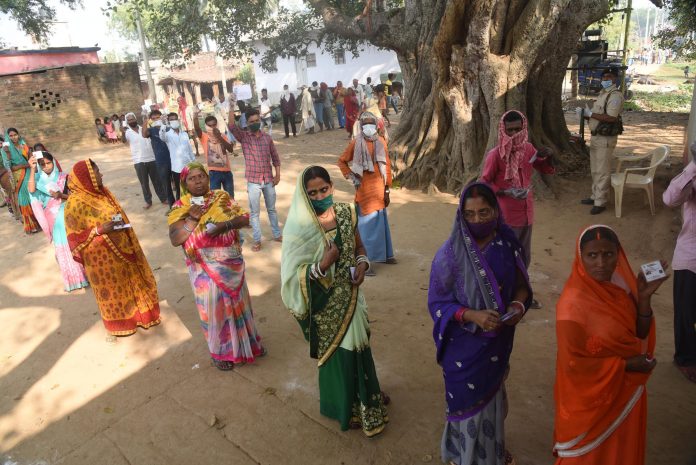Despite an apex court order on candidates with criminal cases, it has made no dent in the state polls with 328 of them contesting in the first phase alone. The ball is now in the court of the EC.
By Sambhav Sharma
Bihar voted in the first phase of elections on October 28 under the shadow of the coronavirus pandemic with new protocols for casting the ballot. But the state’s notorious and perennial problem of legislators with criminal records continues.
Of the 1,064 candidates, who contested in the first phase, 328 candidates, that is 31 percent, declared that they had “criminal cases” filed against them and 244, that is 23 percent, declared that they had “serious criminal cases” filed against them. These facts and other related information have come out in the joint report of the Bihar Election Watch (BEW) and the Association for Democratic Reforms (ADR).
Of the 328 candidates with criminal records, the Rashtriya Janata Dal (RJD) had the highest number of 30, the BJP had 21, the Lok Janshakti Party (LJP) had 24, the Congress had 12, the Janata Dal (United) had 15 and the Bahujan Samaj Party (BSP), eight.
A better picture emerges if one looks at the candidates with declared criminal cases against the total number of candidates from respective parties. The RJD had 73 percent candidates with criminal cases in the first phase, the BJP had 72 percent, the LJP had 59 percent, the Congress had 57 percent, the JD(U) had 43 percent, and the BSP had 31 percent candidates with criminal cases.

This February, the Supreme Court directed political parties to state reasons for the selection of candidates with pending criminal cases by posting them on their websites. The bench of Justice RF Nariman and Justice S Ravindra Bhat asked the parties to also list the reasons why they could not select other candidates without criminal antecedents.
If a political party fails to comply with the Court’s directions, it would be tantamount to contempt of the court. While this was expected to demotivate candidates with a criminal background from entering the electoral fray, the data from BEW-ADR report indicates that it has not stopped parties. The ball, as directed by the Supreme Court’s February 2020 order, is very clearly in the Election Commission’s court.
Former Chief Election Commissioner TS Krishnamurthy said that making voters aware of candidates with criminal antecedents has its limitations. He said most leaders with criminal records enjoy the judicial delay and adversely contribute to democracy. “Such people continue to use their muscle power to overrule the voice of the people. Political parties seem to be less serious about it,” he said.

Krishnamurthy suggested that candidates, who have been chargesheeted six months before the polls, could be suspended, albeit temporarily, from contesting the election if they are found to have indulged in serious offences.
He also said money power should also be curbed from influencing elections. “We need to have a National Election Fund with a corpus for 10 years where corporates can contribute money for which they are given 100 percent tax exemptions. This is how publically funded polls could be contested and even a poor man can independently contest. We need to reduce the money and muscle power from polls to breed good quality democracy in India,” he said.
Former Chief Election Commissioner VS Sampath emphasised putting the information in the public domain so that voters can make a better choice. The system, the courts, the Election Commission, all want that criminal elements don’t get encouragement to come to power, he added.
There are two ways in which candidates with a criminal background can be barred or discouraged. One is through legislation but for whatever reason, that has not been done. The next best way is to inform the people of candidates with criminal backgrounds.
BHU’s political science professor Sanjay Srivastava said the chance of a candidate with a criminal background winning the polls is more in the first past the post system than in proportional representation and other systems. “The corruption in politics is more dangerous than the criminalisation of politics. The MLAs/MPs who have corruption charges or are involved in graft are more dangerous for a democracy than petty or major criminals,” he said and added that the way forward would be to let voters decide whom they want to choose and the government ensuring a free and fair decision.
It is mandatory for political parties at the central and state levels to upload on their website detailed information regarding candidates with pending criminal cases, including the nature of the offences. Political parties will also have to give reasons for such selection and why other individuals without criminal antecedents could not be selected as candidates.
If a political party fails to submit such a compliance report with the Election Commission, it shall bring such non-compliance to the notice of the Supreme Court as being in contempt of the court orders/directions.



Comments are closed.